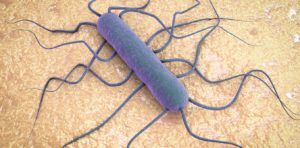 With Listeria outbreaks brewing in both the United States and Canada, as well at Spain and the United Kingdom, it is a good idea to know a bit more about Listeria.
With Listeria outbreaks brewing in both the United States and Canada, as well at Spain and the United Kingdom, it is a good idea to know a bit more about Listeria.
What is Listeria?
Listeria is a bacterium that causes a serious infection called listeriosis. Around 300 deaths are caused by Listeria infection each year, according to estimates from a 2011 CDC report.
Listeria bacteria are most commonly found in raw foods. Vegetables can be contaminated by soil and water carrying bacteria. Listeria is also found in raw animal products, such as meat and cheese.
Babies can be born with Listeria if the mother eats contaminated food during pregnancy. The death rate among newborns with Listeria is 25 to 50 percent.
Who is most likely to get seriously ill from Listeria bacteria?
Healthy adults and children hardly ever become seriously ill from Listeria. However, people at increased risk of illness from Listeria bacteria include:
- Pregnant women – Pregnant women are 20 times more likely to get listeriosis than the average healthy adult
- Newborns
- People with weak immune systems
- People with cancer, diabetes, or kidney disease
- People with AIDS – People with AIDS are 300 times more likely to get sick from Listeria than people with normal immune systems
- People who take gluticocorticosteroids such as cortisone
- Elderly people
Symptoms of Listeria
Listeria symptoms appear anywhere between 3 and 70 days after infection, but usually around 21 days later. Typical symptoms include:
- Fever
- Muscle aches
- Nausea or diarrhea (less common)
If infection spreads to the central nervous system, symptoms can include:
- Headache
- Stiff neck
- Confusion
- Loss of balance
- Convulsions
Symptoms for those with Weakened Immune Systems
If a patient has a weak immune system, Listeria bacteria can invade the central nervous system and cause meningitis or a brain infection.
Symptoms for Pregnant Women and Newborns
Infected pregnant woman experience mild, flu-like symptoms. However, infection during pregnancy can lead to miscarriage, infection of the newborn, or stillbirth. Symptoms usually appear in newborns in the first week of life, but can also occur later on. A newborn’s Listeria symptoms are often subtle, and include irritability, fever, and poor feeding.
Diagnosis of Listeria
Doctors can determine whether patients have listeriosis by taking a blood or spinal fluid sample.
Treatment of Listeria
Patients who present with symptoms of listeriosis can be treated with antibiotics.
Pregnant Women
If a pregnant woman takes antibiotics promptly after contracting Listeria, she can usually prevent the spread of the Listeria bacteria to her child. Babies who have listeriosis usually take the same antibiotics as adults.
How to Prevent Listeria
People with Normal Immune Systems
- Thoroughly cook raw food from animal sources, such as beef, pork, or poultry
- Wash raw vegetables before eating them
- Keep uncooked meats separate from vegetables and cooked foods
- Avoid products made with unpasteurized milk
- Wash hands and cooking utensils after handling uncooked foods
- Consume perishable and read-to-eat foods as soon as possible
People at High Risk (Pregnant women and people with weak immune systems)
- Do not eat hot dogs or lunch meats unless they are heated to a temperature sufficient to kill Listeria bacteria
- Avoid getting liquid from hot dog packages on other food
- Wash hands after handling hot dogs and lunch and deli meats
- Do not eat soft cheeses (e.g. feta, Brie, Camembert, blue cheese, and queso blanco) unless the label clearly states that they are pasteurized
- Do not eat refrigerated pâté or meat spread, only canned or shelf-stable ones
- Do not eat refrigerated smoked seafood, sometimes labeled as “nova-style,” “lox,” “kippered,” or “jerky.” Canned or shelf-stable smoked seafood is ok
Additional Resources for Listeria
About-Listeria.com is a comprehensive site with in-depth information about Listeria bacteria and listeriosis.
Listeria Blog provides up-to-date news related to Listeria outbreaks, research, and more.
Listeria Litigation is a source of past and present lawsuits involving Listeria.
The Marler Clark Listeria lawyers and attorneys have unmatched experience representing victims of Listeria. Our Listeria lawyers have represented thousands of victims of notable Listeria outbreaks such as the 2011 Jensen Farms Listeria outbreak where over 30 people died, the 2010 Sangar Fresh Cut Produce Listeria outbreak, the 2007 Whittier Farms Listeria outbreak and the 2017 Vulto Creamery Listeria outbreak. We are presently assisting in a Listeria outbreak in South Africa that sickened over 1,000 and killed over 200.
Contact us today to learn more about our services and what we can do the help. Call: 1-800-884-9840 or Email: marler@marlerclark.com.
Listeria Outbreak Lawsuits
- Abbott Cheese Listeria Litigation – British Columbia (2002)
- Caramel Apple Listeria Outbreak Lawsuits – Multistate (2014)
- Jensen Farms Rocky Ford Cantaloupe Listeria Outbreak Lawsuits – Nationwide (2011)
- Listeria Lawsuit Filed Against Dole After Two Dozen Sickened
- Marte brand Frescolina ricotta salata cheese Listeria outbreak – Multistate (2012)
- Sangar Fresh Cut Produce Listeria Outbreak Lawsuit – Texas (2010)
- Vulto Creamery Listeria Outbreak Lawsuits – Multistate (2017)
- Whittier Farms Pasteurized Milk Listeria Outbreak Lawsuit – Massachusetts (2007)